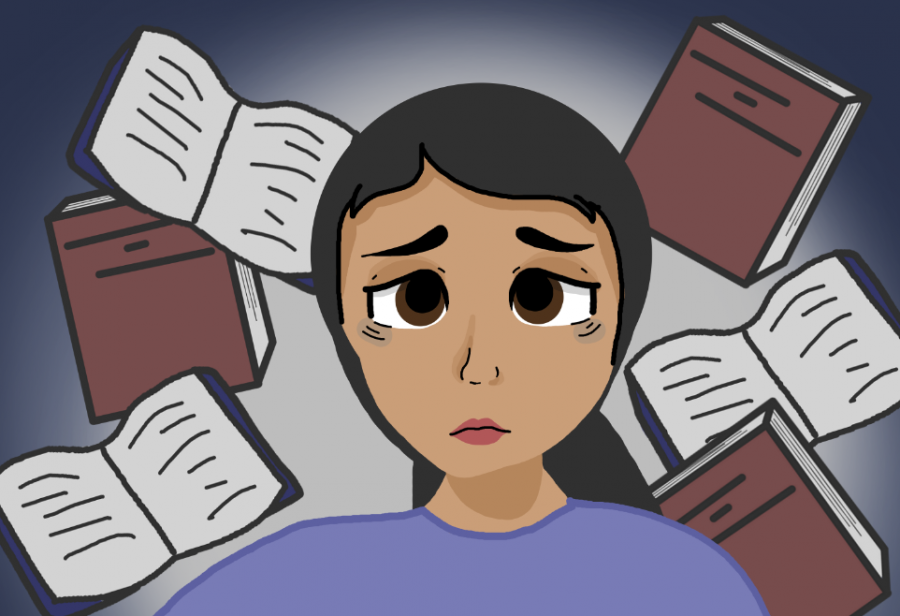OPINION: Beware of student burnout
It’s been a rough semester; make sure to take care of yourself
Finals, coronavirus stress and student life have all conspired to make student burnout even more prevalent than before.
December 10, 2020
Just opening my laptop to begin this column took quite a bit out of me, I won’t lie. Many breaks were required. I rewarded myself for every line I wrote … the typical just-get-through-the-finish-line tactics I’m sure we are all experiencing right about now.
With dead week and finals starting, it was tough to find students who had enough time to answer a few interview questions. The irony of this does not escape me – a column on student burnout requiring students to take more time on their phones and computers to answer a bunch of questions … I know.
In fact, there were a few who volunteered and then backed out due to stress. And herein lies what I believe to be the ultimate cause of burnout this semester: even the things we want to do are exhausting because they are all online.
Though some students saw this semester as an opportunity to become more invested in interests outside of school, most were overwhelmed by the thought of opening another tab on their computer.
“Before doing online school, I enjoyed walking to class and interacting with my peers and learning and doing. Now I feel like school is a chore and it gives me anxiety thinking about it,” Emily McDonald, senior elementary education major, wrote in an email.
Where there was once the enjoyment of interacting with others in class or on our walks to campus, there are now only the same walls of our rooms and kitchens-turned-classrooms for four to six hours a day. I can attest to the dreary reality of this: I took to switching my entire room around every few weeks just for a change of pace.
Student burnout is a “combination of emotional, physical and mental exhaustion brought on from work,” according to Therapy Centre.
The two main side effects are some we can all recognize: exhaustion, which makes it incredibly difficult to feel capable of doing your work, and cynicism, which makes it even harder to want to try.
“My lack of motivation has changed my study habits because I don’t have the passion or drive to do well,” McDonald wrote in an email.
I’m sure many of us can relate to this reality. Even someone like McDonald, who is incredibly passionate about her future career and works hard to be a great future educator, is also exhausted in every way from this semester.
In order to fight this inevitable negativity, many people tried to get more involved by joining new clubs, going to university programs via Zoom and taking on more responsibilities.
“Having online classes has allowed me to be more productive with other aspects of my life,” McCall Penna, senior criminal justice and criminology major, wrote in an email.
In his case, this meant pursuing avenues of personal growth, like exercising or reading. But many students were really looking for more connection with others.
Unfortunately, this also meant more time online. And for once, despite everything our parents have claimed about our technology addictions, we didn’t want to spend all day staring at a screen. The prospect of getting more involved inevitably meant more “Zoom burnout.”
“I used to love interacting with my peers and my professors,” McDonald wrote in an email. “Now most of the time I feel too anxious or unwilling to interact.”
There seemed to be no win-win in terms of mental health.
Students saw classes become more exhausting, despite the fact that all they had to do was roll out of bed and log on. There has been a major loss of motivation – even when we care about the thing we are doing. Our eyes can’t seem to stay open, and our brains won’t focus.
As much as students may be missing in-person classes after this semester, the end of a pandemic is far out of our reach. What we can control is our attitude and our effort. Students like Sydney Brager, junior elementary education major, can attest to the importance of this.
“Even during times where I may have been feeling discouraged, tired or burnt out,” Brager said, “I just had to keep reminding myself of what I was working towards: a future and career that I love.”
Seeing as I also have an endless number of projects to finish and finals to study for, I’ll keep this short: student burnout hit with a different power this semester, and we have to be prepared for it to happen again. Not by comparing what others are doing to cope, but by determining what we need as individuals. We have never experienced learning in this way, so don’t be too hard on yourself for struggling.
Take fewer classes, make time for health-conscious hangouts and please, reward yourself for every sentence you write. You deserve it!






















